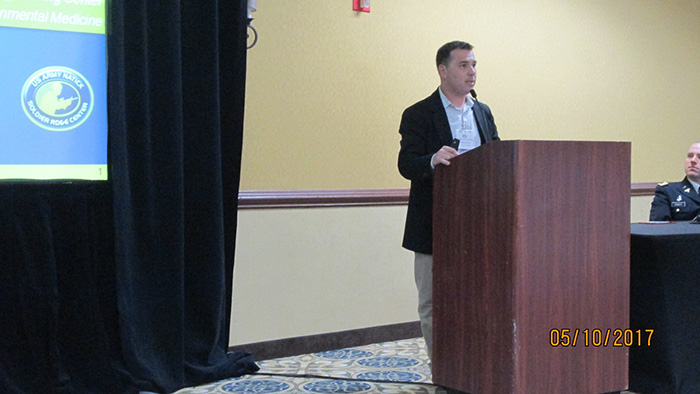Tri-Service Microbiome Consortium Holds Inaugural Workshop

Department of Defense experts in the field of microbiome research gathered for the inaugural Tri-Service Microbiome Consortium May 10-11 in Rockville, Maryland, to discuss collaboration and coordination among DOD services on microbiome-related projects.
The term microbiome is generally used to refer to the collective genomes (genetic material) of all of the microorganisms that inhabit the human body. The term was coined in 2001 by researcher Joshua Lederberg, who defined it as "the ecological community of commensal, symbiotic and pathogenic microorganisms that literally share our body space and have been all but ignored as determinants of health and disease." It is only within the last decade that the scientific community has started to grasp the significant contribution that these microbial communities have on human health and disease. Identifying these impacts and leveraging the information to improve methods for how exposure and response are determined will ultimately result in a more robust assessment of risk.
"Improved understanding of the microbiome could lead to new strategies to combat illness and infections like skin abscesses and food-borne pathogens for example, mitigate effects of stressors such as sleep deprivation that degrade performance, protect against toxicant exposures, and enhance mental well-being in U.S. warfighters and veterans," said Dr. Linda Chrisey, Naval Biosciences program officer and TSMC chair.
The TSMC was chartered by the Office of the Assistant Secretary of Defense for Research and Engineering Human Performance, Training and Biosystems Directorate in December 2016. The TSMC was tasked with establishing a forum for collaboration and coordination among DOD research performers, research sponsors, policymakers and stakeholders on microbiome-related projects.
"The TSMC owes its existence not only to DOD leadership's understanding of the importance and potential for microbiome research to support the Joint Force, but also to an impassioned and motivated community of researchers that has consistently strived to collaborate and coordinate on microbiome-relevant projects," said TSMC Vice Chair Capt. Blair Dancy.
With the desired goal to increase collaboration, the workshop engaged over 70 participants that represented commands from the Army, Navy, Air Force as well as Defense Advanced Research Projects Agency, Office of the Secretary of Defense – Research and Engineering and the Office of Net Assessment, Defense Health Agency, Uniformed Services University of Health Sciences, Special Operations Command and the Department of Veterans Affairs. Additionally, leadership from the National Institutes of Health was present, providing an important interface between the DOD and the NIH.
The breadth of DOD's interest in microbiome research was reflected in the more than 25 oral and poster presentations that highlighted studies of toxin/metal exposures, post-traumatic stress disorder, traumatic brain injury, infectious and inflammatory diseases, the possible role of microbiome in human performance and nutrition, environmental microbiomes, microbiome engineering, and data analysis/management tools.
"The presentations and discussions from the workshop will provide the basis for an annual report for the ASD R&E leadership, as well as prioritizing tasks for the TSMC for the coming year," said Chrisey. "This first meeting will be used as a foundation for the TSMC to move forward in our goal to protect Warfighter health thus ensuring the readiness of the force."
 An official website of the United States government
An official website of the United States government
 ) or https:// means you've safely connected to the .mil website. Share sensitive information only on official, secure websites.
) or https:// means you've safely connected to the .mil website. Share sensitive information only on official, secure websites.


